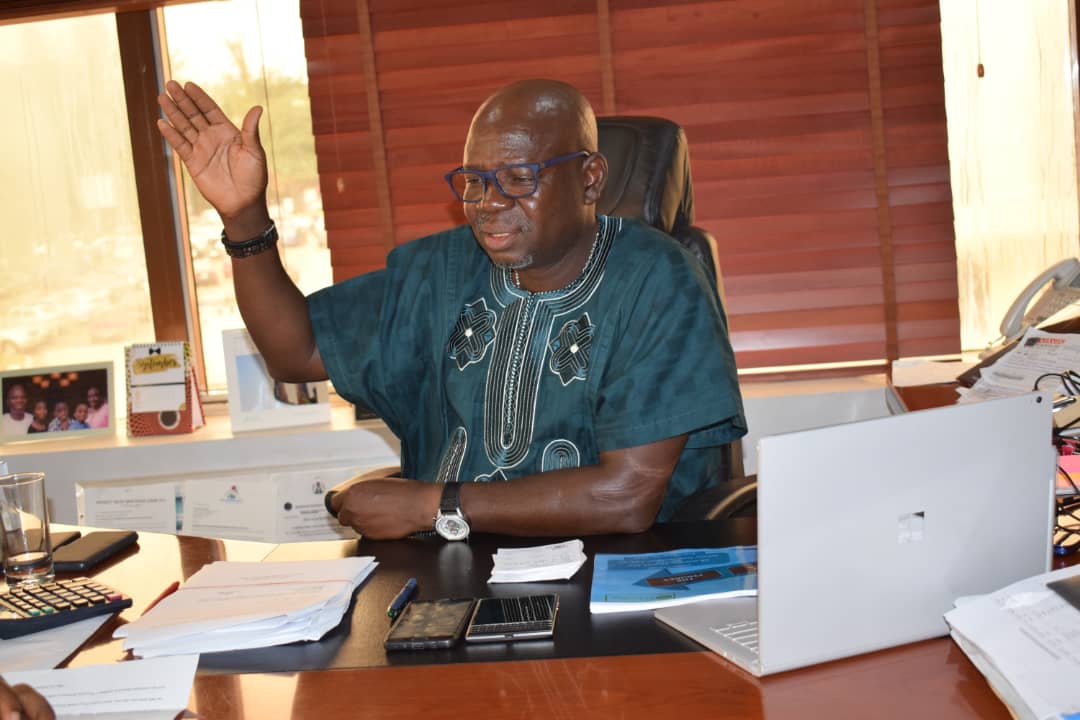Nigeria currently has a housing deficit of 22 million units. To bridge this gap, the government has launched a series of schemes targeted at providing homes for Nigerians at the lower rung of the social ladder. With the minimum wage at N30,000, most citizens cannot afford to buy houses on their salary — this is where mortgage banks come in — but there is an obstacle. Olabanjo Obaleye, chief executive officer (CEO) of Infinity Trust Mortgage Bank Plc, explains to TheCable how the Land Use Act of 1978 is a challenge to the housing industry and why it needs a review.
TheCable: What are the challenges of home financing in Nigeria and what solutions can you prescribe?
Obaleye: Everywhere in the world, housing is a challenge to households because it forms the biggest investment in every household expenditure item. Housing is not something you can say, ”okay, I want to pick from my salary and buy”; it is not that cheap, it’s very expensive. Everywhere in the world. You want a condominium in the UK, the US, or in Canada, you should be thinking about having like $100,000. $100,000 in Nigeria today, we’re talking about N36 million. So, it is a problem worldwide, and that is why government in many nations put special attention on housing because of the importance. Shelter is compulsory. In fact, it is one of the fundamental human rights of people and every responsible government must look into that, and see how it can bridge the gap between people that have and people that have not, because if you have to leave it to the dictates of supply and demand, you will see some people will never get a home. When we talk about housing, we are talking about functional housing.
TheCable: What do you mean by functional housing?
Advertisement
Obaleye: They’re shelters; whether you live under the tree, under a bench, you need to carve something for yourself. The ones we call functional are the kind of houses that are suitable for human living not for animals. It’s not easy to come by. But we have many of such houses (non-functional) in Nigeria so we can’t count them as part of the housing available.
TheCable: Nigeria currently has a housing deficit of 22 million units. How can this gap be bridged?
Obaleye: Many policies that would ensure this gap is closed up are already being implemented. The funding aspect is one of it. (Also), affordability is a big issue. If you create mortgages, or if you have houses, and you don’t have people that have the capacity to buy yours; you’ve not done anything, so there are two sides to it. The demand side and the supply side. Once there is demand, there must be supply. But now, there is no demand. Because you consider a source of funding; we don’t have a special vehicle to fund this — we go to the market. Commercial banks are allowed to collect deposits from various sources. They do forex trading and all those things, so they have big balance sheets to do this. We don’t have that. Even when we don’t have funds again, we lean on them to give us funds, which means we borrow money from them to fund our mortgages, so it cannot be cheap. So, the government has looked at this to make sure mortgage is available and affordable for people. The Land Use Act of 1978 empowered government to administer land on behalf of the people, so in most countries, they look at the value chain possibilities in giving out land for certain things and what they will get out of it. So, they encourage people to come and get land free because they know when you use that land for productions, you will engage people.
Advertisement
TheCable: What do you call affordable housing? Is housing really affordable in Nigeria?
Obaleye: Well, when you talk about affordability, you can look at it in different contexts. What’s affordable to me may not be affordable to you, so we cannot generalise affordability, but when we are talking about social housing, we talk about the categories of people. We can say the lower class, middle-class, and the upper-class. Upper-class has no problem with housing. The biggest headache we have is in the lower class. Even for the lower-class, we can still categorise them to lower-lower and lower-class. Now, the lower-class they can only come to this affordability scheme with subsidy from the government. Without that, there is no way their salary can pay for it. And what every responsible government does in this category is to see how to get from those people who are in the upper-class to fund those people who are in the lower-class. I think that is what the CBN is trying to put on now that will crash down the interest rate. Once we have interest rates for banking loans, either mortgage or others coming to single digits, then you will see activities; production will start coming up. Risk sector is dying because without this subsidy, they can’t get anywhere. But subsidy is not sustainable anywhere. We have to just be producing to get to where we are going. But to bring this people to this affordability first, government has to reduce the cost and the trouble in obtaining land, in getting title for the land, because that is a big problem, for us in the mortgage industry. We can’t perfect mortgages if you don’t have good titles to the land. That is C of O preferably.

TheCable: Can you put a price tag on affordable housing?
Obaleye: It’s difficult. Let me very practical with you. To get a loan of N5 million, if you want say that is affordable housing; you must be earning about N150,000 every month to be able to pay. The civil servant, if you’re earning N150,000 per month, maybe you’re in level 12 or thereabout. So, it’s not even easy, but for people in the private sector, yes they will be able to afford it. So it’s difficult to put a tag unless government comes up and makes a pronouncement that, ”a house of N5 million is affordable housing”. Some people might take the government up on that. It’s not affordable for me. That is why the National Housing Fund, which is targeted mostly at the lower cadre of Nigerians, says if you need a loan of N5 million and below, you don’t need to have equity contribution. What do I mean by equity contribution? You must have your skin in the game. You need a loan to buy a house. Give us 20 percent and we’ll give you 80 percent. Some people find it difficult to assemble that 20 percent together, but from the Federal Mortgage Bank angle, they consider N5 million as affordable, so we don’t want to compound the problem more. You don’t need to bring equity. We give you N5 million 100 percent. Then from government angle, that is affordable. But be that as it may, some people might still not be able to afford it, and again, if you look at affordability again, you might look at the geographical locations of the house you want to talk about. Can N5 million give you any house in Abuja? It cannot give you any house. N5 million can give you a house in my village; it’s possible because I won’t pay for the land.
Advertisement
TheCable: How is the Land Use Act affecting mortgage financing?
Obaleye: The intentions of Land Use Act was laudable. The act came into being to solve the problems of difficulties in people having access to land. People can’t manage their land. Investors come in, it is difficult to know who owns the land; what the limit of the land is. So for development, Land Use Act came into being and said all lands will be managed by the state governors on behalf of the people just to streamline the process of acquiring land or having access to land. You want to build industry, even government wants to build industry. You have investors from all over the world, they want to get into this but they don’t know who owns the land. That is the intention of Land Use Act which is laudable. But you know we are good at putting policies and planning in place but implementing them is a problem. Now, I don’t see any reason why that one should actually create a problem. You want a land, the land is already delineated. “Government, this is my land. Give me my certificate of occupancy of the land. They give you a certificate of occupancy of the land for 99 years. I shouldn’t have any reason to come back to government when the 99 years has not expired to do anything I need to do on my land but land use has specified every transaction on land or transfer of land, you must get government consent on it. This creates bottlenecks in the administration of land in Nigeria, then most land are not captured in such a way that you can sit down in the office and check to see if a particular piece of land is available or not available or who owns the land. You don’t have records, you don’t have data, so that makes access to land equally difficult. So these are the things government is supposed to do to streamline the purpose. So, again, Land Use Act was in 1978 and it has not been reviewed because it has been [in the constitution] since then. Many developments have overshadowed some of the things in the Land Use Act. Now, we are in the digital world, we don’t need to be doing this kind of transaction any longer. So, the major bottleneck this Land Use Act has created is just a show of government concerns, transfer of land and the rest.
TheCable: Do you think the Land Use Act is a problem to mortgage financing? Is it affecting the industry?
Obaleye: Yes, it affects the industry. If Land Use Act is amended, certain parts of it; it won’t be a problem. It’s just the process of amending part of it that is bringing issues. There are many things that are happening now that Land Use Act then didn’t foresee. The intention of the Land Use Act is laudable but it is just that it needs to be reviewed to take care of the developing exigencies.
Advertisement
TheCable: Some Nigerians are afraid of taking out mortgage. There is a perception that it is a difficult burden of debt to bear, Is it so?
Obalaye: If you live in the US, the UK, or Canada, if you don’t have loan history, you are a nobody. So, if I have to borrow money and live a quality life, I don’t see anything wrong in that. It’s just that I have to be disciplined. If there are some unnecessary expenditures that I have in my payroll, remove it. Do you know that mortgage can make you financially disciplined? You’re earning N200,000; you’re paying N60,000. What you’re earning has become N140,000. Automatically, you manage all your expenses to be within that N140,000. You’ve forgotten about the fact that you’re earning N200,000. Do you understand? So, it is something that can be worked out. It’s just for us to have commitment that this obligation we have, must not default. And again, many initiatives are coming on in the financial sector that will make it almost difficult for people to default, because by the time the financial institutions open up, and people can walk in and get loans easily because the penalty is severe- if you fail in paying the mortgage your house can be taken away from you- you know that you don’t want to default, and again if you default in a bank, you can’t go to another bank. Now, before we give anybody a loan, we have to check their credit history. If we see that you are a defaulter, we can’t give you a loan anymore.
Advertisement
TheCable: There is also the challenge of regulation in the sector, how does that affect investment?
Obalaye: Yes, I think CBN is turning up to its duty on this. You know, the best way to assess a situation very well is to get yourself involved in it. If you are not involved, you cannot know exactly what the problem is. From afar, you can be given policies that will be counterproductive, but this has been realised now. For instance, there is a new policy that came out, which is peculiar to mortgage finance. You just have to understand that mortgage finance is different from commercial banks. It’s totally different. Commercial banks give out money for three months, one month, one year. But mortgage does long term; 10 years, 15 years, 20 years, 25 years, 30 years as the case may be. So there are many things you have to look at and mortgage is a technical thing. You have what they call fixed term mortgage and you have variable mortgage. If you engage in fixed term mortgage, it means that if what the interest rate is 60 percent like with the Federal Mortgage Bank, for 30 years; it means it won’t change for 30 years. If the Federal Mortgage Bank reviews its rate tomorrow to 20 percent, it won’t change from 60 percent. It will still be 60 percent. But if it’s variable. So, you cannot now link the interest rate of mortgage banking to MPR. I think this has been realised and a circular has come out this week that just like commercial banking where the limit is MRI plus four; you can’t use that limit for mortgage finance any longer. So if the regulators involve themselves very well to understand the technicalities of the various aspects of other financial institutions, then they will be able to give the policies that will make the sector more impactful than we have now. And I think we are on this threshold now.
Advertisement







